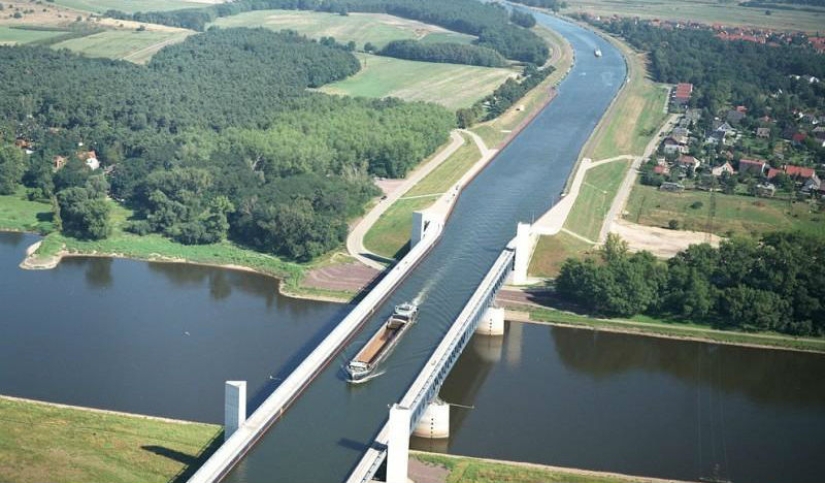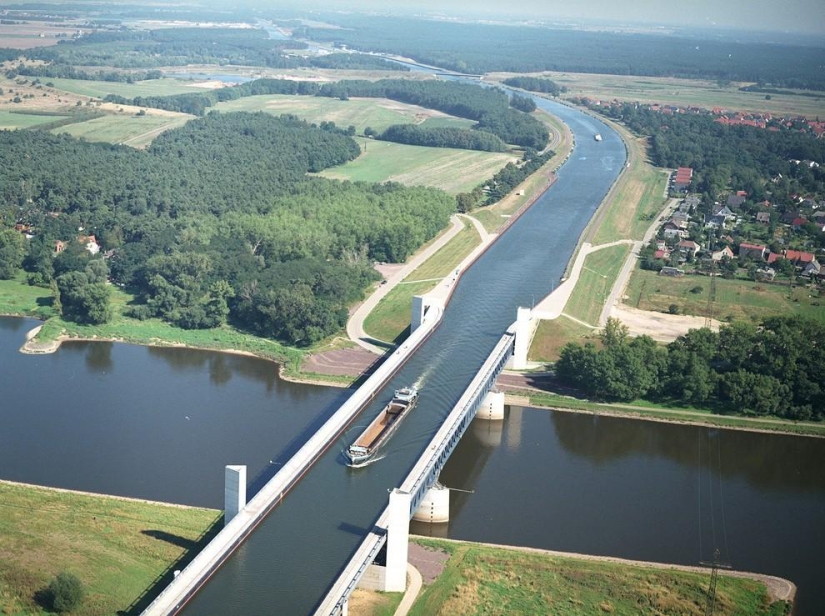Three of the most impressive water bridge in the world
Categories: Design and Architecture
By Pictolic https://pictolic.com/article/three-of-the-most-impressive-water-bridge-in-the-world.htmlThe so-called water bridges are bridge structures that support water channels through which it is possible to navigate a relatively small vessels. They are built over rivers, valleys, Railways or roads. Although the aqueducts was used to supply water for many centuries, they have never been used for the movement up to the XVII century, when they began to appear canal system, as we see them nowadays.
We present you the three most prominent water bridge in the world. Looking at some photos, you might think that they were made in photoshop. However, these bridges exist and function in real life.

The Magdeburg water bridge (Magdeburg Water Bridge)

The most popular and impressive water bridge in Magdeburg, Germany. It is the longest navigable aqueduct in the world, with a length of 918 meters.

Opened in October 2003 as part of the Magdeburg system of waterways, it connects the canal, the Elbe-Havel with Mittelland channel, crossing the river Elbe on top.

Channels the Elbe-Havel and Mittelland previously met near Magdeburg but on opposite banks of the Elbe river, the water level which is lower than in both channels. Therefore, the courts, swim across from one channel to another, had to do a 12-kilometer loop and use gateways and slipways. While reducing the water level in the river for loaded barges and this version became impossible.

The reunification of Germany and the establishment of major water transport routes made the construction of the water bridge a priority. Work began in 1997. In the end, the construction took 6 years and about 500 million euros.

The water bridge now connects Berlin's river port with numerous ports on the Rhine river.

Aqueduct Pontcysyllte (Pontcysyllte Aqueduct)

Pontcysyllte aqueduct in Wrexham, UK, was built in 1795-1805 years to "throw" the Ellesmere canal through the valley of the river Dee and connect the coal mines of Denbighshire with the national canal system during the Industrial revolution.

The aqueduct was one of the most significant global achievements of the time. For over 200 years it remained the longest and highest aqueduct in Britain. In 2009, Pontcysyllte aqueduct was inscribed on the world heritage list of UNESCO.

The length of the aqueduct is 307 meters long and 3.4 meters, depth — 1.6 meters. It is part of the 18-kilometer-long system of aqueducts.

The aqueduct consists of a cast iron trough supported at a height of 38 metres above the river railway arches, supported by 19 hollow stone columns.

The use of the construction of the aqueduct of iron and steel is allowed to make light and strong arches, creating both an effect of monumentality and elegance.

The channel had a significant impact on the economic welfare of the region during the first half of the nineteenth century, contributing to the rapid development of coal mining, metal processing, developing limestone quarries and lime production. Shale career in the mountains of Wales and agriculture also have won at the expense of the channel.

Today the canal is no longer carrying the coal and lime, and is a very popular tourist destination.

Since 1954, the channel is managed and maintained in a condition suitable for navigation, the British control of the waterways.
Turning aqueduct in Barton (Barton Swing Aqueduct)

This rotary aqueduct is a moveable water bridge, located in Barton, UK, on the river Irwell. It "carries" the canal Bridgewater canal across the Manchester Ship.

Swivel mechanism allows large vessels to sail through the canal Manchester Ship and a small narrow boat to cross it on the top. When a large ship must pass through the channel, the iron bridge with a length of 100 meters and a weight of 1450 tons rotated 90 degrees.

The gateways at both ends of the trough bridge hold about 800 tons of water. Other gateways, on the banks of the canal, retain water in the area adjacent to the bridge sites. The same swing bridge, but designed for the road, is situated here, just upstream.

This aqueduct is the first and only rotary aqueduct in the world. He is a real masterpiece of Victorian architecture. Built in 1894, the bridge continued to be regularly used for its intended purpose.

Earlier on this water bridge was conventional stationary stone aqueduct, which is not allowed to pass the new vessels of large size. Therefore, the construction of the swing bridge has become a necessity.

Turning aqueduct (left) in the closed position shall crossing Bridgewater canals and the Manchester Ship. Road swing bridge on the right.
Keywords: Britain | Germany | Bridge | Design and architecture | Canal | River
Post News ArticleRecent articles

Most of us loved as kids magic tricks, but someone loves them right now. However, the attitude to the hoax became a few others ...

Everything is changing. This is well and has long been known to everyone. But when something stays with you for a long time, it is ...
Related articles

In the Victorian era Britain was quickly urbanized. By 1851 it became the first country lived in cities of more people than in the ...

Walking through this picturesque bridges, you can admire the views from these stunning views and breathtaking landscapes. We invite ...

Spent an entire year of British photographer Simon Roberts (Simon Roberts), exploring the vast Russian expanses. It was almost 14 ...

Compared to the 1970-ies 1980‑e years were a time of cautious optimism in new York. Boom on wall street fueled the speculative ...